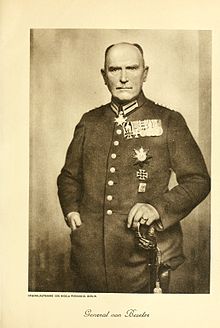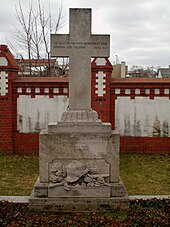Hans von Beseler
Hans Hartwig Beseler , von Beseler since 1904 (born April 27, 1850 in Greifswald , † December 20, 1921 in Neubabelsberg ) was a Prussian Colonel General and politician of the Wilhelmine era .
Life
origin
Beseler came from a family from the Duchy of Schleswig and was the son of the famous legal scholar Georg Beseler (1809-88). His brother was the Prussian Minister of Justice Max von Beseler . On January 27, 1904, on the Emperor's birthday, he was raised to the Prussian nobility .
Career

Beseler entered the Prussian military service with the Guard Pioneer Battalion in Berlin on April 1, 1868 and took part in the Franco-German War as a secondary lieutenant in 1870/71 . On June 15, 1875, he became a prime lieutenant and from October 1, 1876, attended the War Academy in Berlin. On September 24, 1884 he joined the General Staff of the 30th Division in Strasbourg as a captain with a patent from April 18, 1882 . From September 19, 1888 he was major and on November 26, 1892 general staff officer at the IX. Army Corps in Altona. On October 17, 1893 he became a lieutenant colonel and had been a department head in the War Ministry from November 17, 1893 . On March 22, 1897 he was promoted to colonel and took over command of the 5th Rhenish Infantry Regiment No. 65 in Cologne on August 10, 1898 . On October 17, 1899 he was promoted to senior quartermaster in the general staff . On January 27, 1900 he was promoted to major general and on April 18, 1903 to lieutenant general , at the same time he took over the leadership of the 6th division in Brandenburg an der Havel . Long planned as the successor to the Chief of Staff Alfred von Schlieffen , Beseler was only appointed Inspector General of the fortresses on September 15, 1904. On November 9, 1907, Beseler was promoted to General of the Infantry and finally put up for disposition on May 11, 1911 .
Beseler joined the Free Conservative Party after his departure and was a member of the Prussian mansion for them from 1912 onwards . He stood à la suite of the Guards Pioneer Battalion.
At the beginning of the First World War , Beseler, like Paul von Hindenburg , was called up again for active service, initially as commanding general of III. Reserve Corps . The large association came to the Western Front in the early stages of the war and took part in the siege of the fortress of Antwerp . Beseler was finally given command of all attack troops on September 27, 1914 in the form of an army group Beseler directly subordinate to the OHL . Beseler's soldiers conquered the city and fortress by October 10, which was celebrated as a great success in the German Empire. In autumn the III. Reserve Corps to fight heavy fighting at the front in Flanders . In 1915 Beseler was relocated to the Eastern Front. Again he got an army group Beseler , which besieged the fortress Nowogeorgiewsk ( German fortress Modlin , at the confluence of the Vistula and Bug , about 50 km northwest of Warsaw) and captured it from August 4th to 20th, 1915. A few days later the army group was disbanded.
On August 26, 1915, Beseler became Governor General of the General Government of Warsaw - a sub-area of the previous Russian Poland that was subordinate to German civil administration. He re-admitted many social groups that were forbidden under the tsarist rule, including Jewish associations. He had a “Jewish Refereat” set up; Its management was taken over by the lawyer and lieutenant in the reserve Ludwig Haas from Freiburg im Breisgau , who was active in Jewish associations . However, the initially open-minded mood in Warsaw's Jewish communities gave way to protests after Beseler had 5000 mostly Jewish unemployed people recruited into “labor battalions”.
As German governor general, Beseler proclaimed the establishment of an independent kingdom of Poland (so-called regency kingdom ) agreed by the occupying powers of the German Reich and Austria-Hungary in 1916 . The Warsaw elite were invited to the royal palace for the ceremony , and several thousand people with Polish flags gathered on the palace square. With the active help of his close colleague, the Polish-Prussian aristocrat Bogdan Graf von Hutten-Czapski , he re-established the Polish -speaking University of Warsaw and the Warsaw University of Technology .
Beseler did not succeed in setting up a " Polish Wehrmacht ", which was one of the main purposes of the Central Powers in establishing an "independent" Poland: the legionnaires of Józef Piłsudski , who were to provide the officer corps of the new Wehrmacht, refused to take the oath on the two Kaiser Wilhelm II and Karl I were interned afterwards, Piłsudski himself in the Magdeburg fortress .
On January 27, 1918 Beseler received his promotion to Colonel General. His policy ultimately failed; He was busy building the Kingdom of Poland and vigorously opposed the efforts of Erich Ludendorff to carry out a fourth partition of Poland and to incorporate a "protective strip" from border areas of Congress Poland into the German Reich. At the same time, he lost supporters among the Poles when the coming defeat of the Central Powers became apparent.
Fearing the German soldiers ' councils, Beseler (disguised as a worker, on November 12th around 5 p.m.) fled with his two adjutants and two Polish officers provided by Piłsudski on a Vistula ship from Warsaw to Thorn and from there to Berlin . He died a broken man near Potsdam in 1921 . Beseler was buried in the Invalidenfriedhof Berlin . His grave is preserved.
His contemporaries Hutten-Czapski , Hermann Fürst von Hatzfeldt and Maria Fürstin Lubomirska - wife of Zdzisław Lubomirski - praised him: Hutten-Czapski: “As Inspector General of the Engineer and Pioneer Corps and the fortresses, he had also acquired administrative experience. These talents and abilities combined with an elegant and ideally directed character. Imbued with the feeling of his great task and position, he did not deny the simple humanity of his being. He had a real understanding of the situation of the people entrusted to him, of their national and cultural characteristics. "Hatzfeldt:" He has a crystal clear head, and you couldn't have sent anyone better than him to Warsaw. Anyone else, when asked how he envisions the future of Poland, would have immediately finished with his plan. Beseler only said: Give me time, if I were to express my opinion today, it would only be the opinion of the others. "Princess Lubomirska:" Our Governor General Beseler is a good person, full of good intentions, but he cannot rule. his specialty are fortresses: he will remain in the historical memory as a conqueror of Antwerp and Modlin, as a person with thorough knowledge, full of knowledge and with a high artistic culture ” .
family
He married Clara, née Cornelius (* 1867) on October 1, 1885. The couple had three daughters:
- Olga Emilie Margot (1886–1972) ⚭ August 5, 1914 Wilhelm von Gynz-Rekowski († 1914)
- Katharina Elisabeth (* 1888)
- Asta (* 1897) ⚭ 1921 Eberhard-Joachim von Westarp (1884–1945), writer
Honors
Orders and decorations
- Knight of the order Pour le mérite with oak leaves.
Honorary doctorate
- October 19, 1914: Honorary doctorate from the Royal Technical University of Hanover (Dr.-Ing.eh)
Other honors
- 1915: Honorary citizen of Greifswald . Honorary citizenship was revoked in 1991.
literature
- Gothaisches Genealogisches Taschenbuch der Briefadeligen houses. 1919. Thirteenth year, Justus Perthes, Gotha 1918, p. 64.
- Bogdan Graf von Hutten-Czapski: Sixty Years of Politics and Society . tape 1-2 . Berlin 1936.
- Genealogical manual of the aristocracy , Adelslexikon Volume I . tape 53 of the entire series. C. A. Starke, 1972, ISSN 0435-2408 .
- Acta Borussica Volume 10 (1909–1918) (PDF; 2.74 MB)
- Werner Conze: Beseler, Hans Hartwig von. In: New German Biography (NDB). Volume 2, Duncker & Humblot, Berlin 1955, ISBN 3-428-00183-4 , p. 176 ( digitized version ).
- Princess Maria Lubomirska: Pamiętnik 1914–1918 . Poznan 2002, ISBN 83-8613892-0 .
- Robert Spät: For a common future? Hans Hartwig von Beseler as Governor General in Poland 1915-1918 , in: Journal for East Central Europe Research 58 (2009), pp. 469–500
- Arkadiusz Stempin: Próba “moralnego podboju” Polski przez cesarstwo niemieckie w latach I wojny światowej. Warsaw 2013, ISBN 978-83-7543-264-0
- Arkadiusz Stempin: The forgotten Generalgouvernement. The German occupation policy in Congress Poland 1914–1918 . Ferdinand Schöningh, Paderborn 2020. ISBN 978-3-506-78552-7
Web links
- Literature by and about Hans von Beseler in the catalog of the German National Library
- Newspaper article about Hans von Beseler in the 20th century press kit of the ZBW - Leibniz Information Center for Economics .
Individual evidence
- ^ Krzysztof Dunin-Wąsowicz: Warszawa w czasie pierwszej wojny światowej. Warsaw 1974, p. 65.
- ↑ Egmont Zechlin: German politics and the Jews in the First World War . Göttingen 1969, p. 189.
- ↑ Egmont Zechlin: German politics and the Jews in the First World War. Göttingen 1969, p. 211.
- ^ Krzysztof Dunin-Wąsowicz: Warszawa w czasie pierwszej wojny światowej. Warsaw 1974, p. 43.
- ↑ Werner Conze: Beseler, Hans Hartwig von. In: New German Biography (NDB). Volume 2, Duncker & Humblot, Berlin 1955, ISBN 3-428-00183-4 , p. 176 ( digitized version ).
- ^ The honorary citizens of Greifswald. Retrieved May 2, 2016 .
| personal data | |
|---|---|
| SURNAME | Beseler, Hans von |
| ALTERNATIVE NAMES | Beseler, Hans Hartwig von (full name) |
| BRIEF DESCRIPTION | Prussian Colonel General and politician of the Wilhelmine era |
| DATE OF BIRTH | April 27, 1850 |
| PLACE OF BIRTH | Greifswald |
| DATE OF DEATH | December 20, 1921 |
| Place of death | Neubabelsberg |

